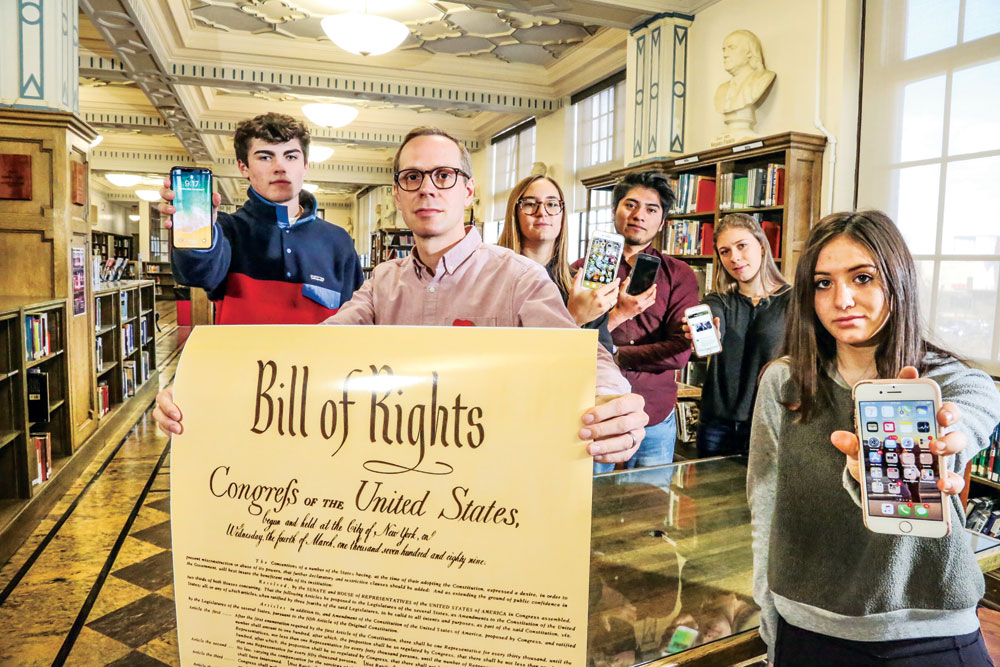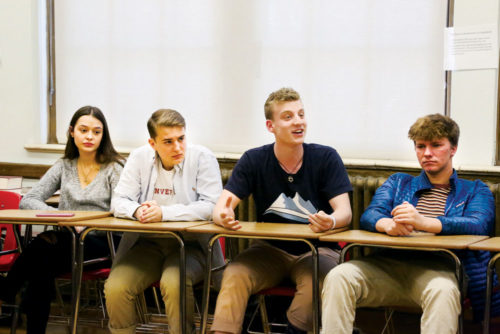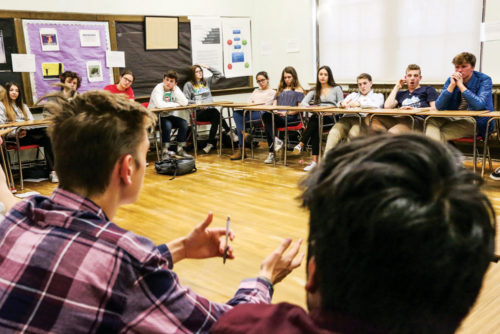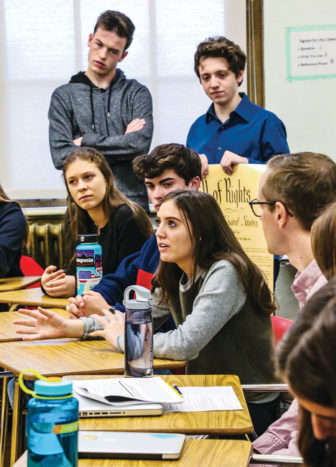East High School’s constitutional law students have had an impressive record of achievement in constitutional law competitions over the years. The students in Matthew Fulford and Susan McHugh’s class, in the East tradition, were well-versed about the historic context of James Madison’s words, “Congress shall make no law…abridging the freedom of speech…” They spent 90 minutes exploring its meaning in today’s world of social media.

East High School Constitutional Law teacher Matthew Fulford and some of his students gather in the library prior to class. Students show the phones they use to exercise their First Amendment right of free speech as Fulford holds the document that gives them that right. From left, students are: Walker Young, Jenny Nolan, Marco Jimenez, Rebecca Chapman, Abby Schuman.

Matthew Nekritz argued that social media has increased the opportunity for democracy.
James Madison, 1787 (a year before the Constitution’s ratification):

East High School Constitutional Law class students discussed what types of speech are protected under the First Amendment and what is not (e.g. obscenity and pornography). One student noted that social media is often more restrictive of imagery than it is of words.
“The influence of factious leaders may
kindle a flame within their particular States, but will be unable to spread a general conflagration through the other States.”
Henry Fox, 2018, East High School Constitutional Law class: “He [Madison] would maybe change that if he were able to see the advances in technology. How the internet gives voice to those factions has absolutely changed…connecting 1% of the population with everybody else who thinks that way really overrepresents those groups.”
—————–
East High School Constitutional Law class students discussed what types of speech are protected under the First Amendment and what is not (e.g. obscenity and pornography). One student noted that social media is often more restrictive of imagery than it is of words.Fast-forward to today, and Madison’s words seem anemic in the age of viral videos, White House tweetstorms, and bots conveying targeted (mis)information across the web. Does social media enhance democracy or erode it? Students in Matthew Fulford and Susan McHugh’s Constitutional Law class at East High School tackled this question and its First Amendment implications the day after the midterm elections. Having come of age in an era saturated with social media, these perceptive teens offered views that reflected on Madison, the nation’s current polarization, and First Amendment rights in the internet age.

Abby Schuman shares her views during the class discussion. One subject that arose was the idea that even though social media brings hate speech to the surface, keeping it underground would make it even more nefarious.
First, some history
Let’s face it. Our Founding Fathers were, for the most part, elitists. Radical as the American experiment was at the time, they were intentional in establishing a democratic republic rather than a direct democracy. In a republic, people do not have a direct voice in government but select individuals to represent them—a logical choice in an era when most people were illiterate. Only white, educated men of property could be trusted to make decisions unblemished by self-interest. Women, people who did not own property, those who had been enslaved, and others did not merit a voice at all in this noble experiment.
In fairness, the Founding Fathers did consider direct democracy. James Madison grappled with the question of both forms of government in Federalist #10, concluding that a republican form of government could best safeguard both majority and minority interests. Though concerned that factions might whip up support for unsavory causes contrary to national interests, geographic distances provided a sort of security whereby passions would cool before inflaming the public beyond a particular locality. “The influence of factious leaders may kindle a flame within their particular States, but will be unable to spread a general conflagration through the other States. A religious sect may degenerate into a political faction in a part of the Confederacy; but the variety of sects dispersed over the entire face of it must secure the national councils against any danger from that source.”
What do East’s constitutional law students think?
“I feel like the existence of the internet makes it a lot easier for people to find different perspectives,” said junior Sophie Goldberg. “This is purely theoretical, but if there were a newspaper run by the government, they would be able to put whatever information in that they want with no check on the accuracy of that information; however, if there are multiple news sources out there—of course, some might be the Breitbarts of the world—but if they are the New York Times, they are checking Fox News, which is checking CNN, for example. That allows people to think critically about the information they are getting, solely by being able to see a lot of different perspectives.”
Junior Aiden Glennie suggested that many viewers, however, were more focused these days on trying to determine if the information presented was true rather than “processing it how they should be.” Kacey Tanner contended that “the standards for genuine academic discourse have not been lowered,” because people who are passionate about politics continue to do the research to find the most accurate source and check each other when they are wrong about something.
Matthew Nekritz stated that social media “has actually aided democracy and we saw it yesterday. Voter turnout in this year’s midterms for younger voters, mostly millennials, is projected to have gone up 188% this year.” While he acknowledged that some of this increase is due to greater polarization, he asserted that “it’s also due to other people who are not actually news sources–such as celebrities—pushing people to vote through social media….I would say in that sense, it has increased the opportunity for democracy.”
Though “mob rule” wasn’t the phrase students employed, Madison’s fear of the rabble sullying the virtuous republic with their emotional demands resonated with some, who expressed concern over the internet’s ability to amplify the voices of outliers on both sides of the political spectrum. People empowered by the anonymity of a keyboard and a screen can now share their hateful ideas and find a virtual community of like-minded souls. While a number of students agreed that political leaders should condemn hate speech and incendiary speech, most seemed to concur that the responsibility for establishing the boundaries of free speech online falls on the shoulders of private companies operating sites like Facebook, Snapchat, and Twitter.
Several of these future voters spoke to social media’s democratizing effects. Kennedy Austin suggested that, as polarized as we are today, the internet has also made our society more politically engaged than ever before. Social media allowed the students at Parkland to share information and organize, quickly turning a local tragedy into a national movement. Social media allows constituents to easily determine whether their senators and representatives are fulfilling their campaign promises, increasing their accountability to the electorate. Notwithstanding these benefits, some mourned the loss of political compromise and the facility to “disagree agreeably,” as Goldberg phrased it, which social media seems to exacerbate.
Returning to James Madison’s vision of the republic, however, Henry Fox considered what that Founding Father’s view would be in the modern world. “By looking at Federalist #10 we can see Madison’s view of factions and how he thought they would counteract [each other] in a diverse and broader community. He would maybe change that if he were able to see the advances in technology. How the internet gives voice to those factions has absolutely changed…connecting 1% of the population with everybody else who thinks that way really overrepresents those groups.”
Though the class ultimately did not reach consensus on the question of social media and democracy, their respectful, well-informed, and carefully reasoned exchange of ideas embodied the best of our democracy and underscores the value of civics classes such as this. It was in the education of our youth that the Founding Fathers invested their hopes for the nation, even as they confessed their doubts as to the republic’s endurance. As the contentious Constitutional Convention was finishing its work of crafting the Constitution in 1787, George Washington told a Georgia delegate “I do not expect the Constitution to last for more than 20 years.’’ In fact, of course, the U.S. Constitution is the oldest in the world. Washington’s pessimism, however, reminds us of its fragility.



Do you have a source for this quote?
As the contentious Constitutional Convention was finishing its work of crafting the Constitution in 1787, George Washington told a Georgia delegate “I do not expect the Constitution to last for more than 20 years.’’ In fact, of course, the U.S. Constitution is the oldest in the world. Washington’s pessimism, however, reminds us of its fragility.
I have been trying to track it down but so far have only found it referenced as early as the 1980s.
Hi John,
Yes, this is the source: https://apnews.com/article/5eca853625d90c0489dd44ec2dfa9f1a
The article states that these documents had been recently discovered when it was published in the late 80s. I used to teach college-level history in the 90s and remember using this quote since it was so surprising…and dug around to find it again when asked to write this FP piece. Hope that helps!
Thank you for the comment; however, I stand by the facts presented. “The majority” you speak of appears to be very narrowly defined – a majority of white males in New England. That’s not a majority of people in colonial America. About 60% of white New England males were literate, based on Kenneth Lockridge’s 1974 work; I don’t believe that’s been updated, since it’s what everyone cites. But in doing so, you are ignoring well over 50% of the population (women, enslaved people, Native Americans and other marginalized groups).See: http://www.history.org/foundation/journal/winter11/literacy.cfm
There are factual issues with this piece. The majority of people in colonial America were literate. Slaves and rural populations had lower rates of literacy, but it was very high in general.
Sadly today, many high school students cannot read and digest Thomas Paine’s Common Sense. In colonial days, literacy was not just functional. Citizens read for recreation. There were no electronic devices or radio. Novels and plays and the classics were read for recreation.
Thank you for the comment. Actually, literacy rates were only about 60% for White New England males, generally considered by historians to be among the most educated colonists. This figure, however, excludes a big proportion of the population and isn’t truly a majority. http://www.history.org/foundation/journal/winter11/literacy.cfm